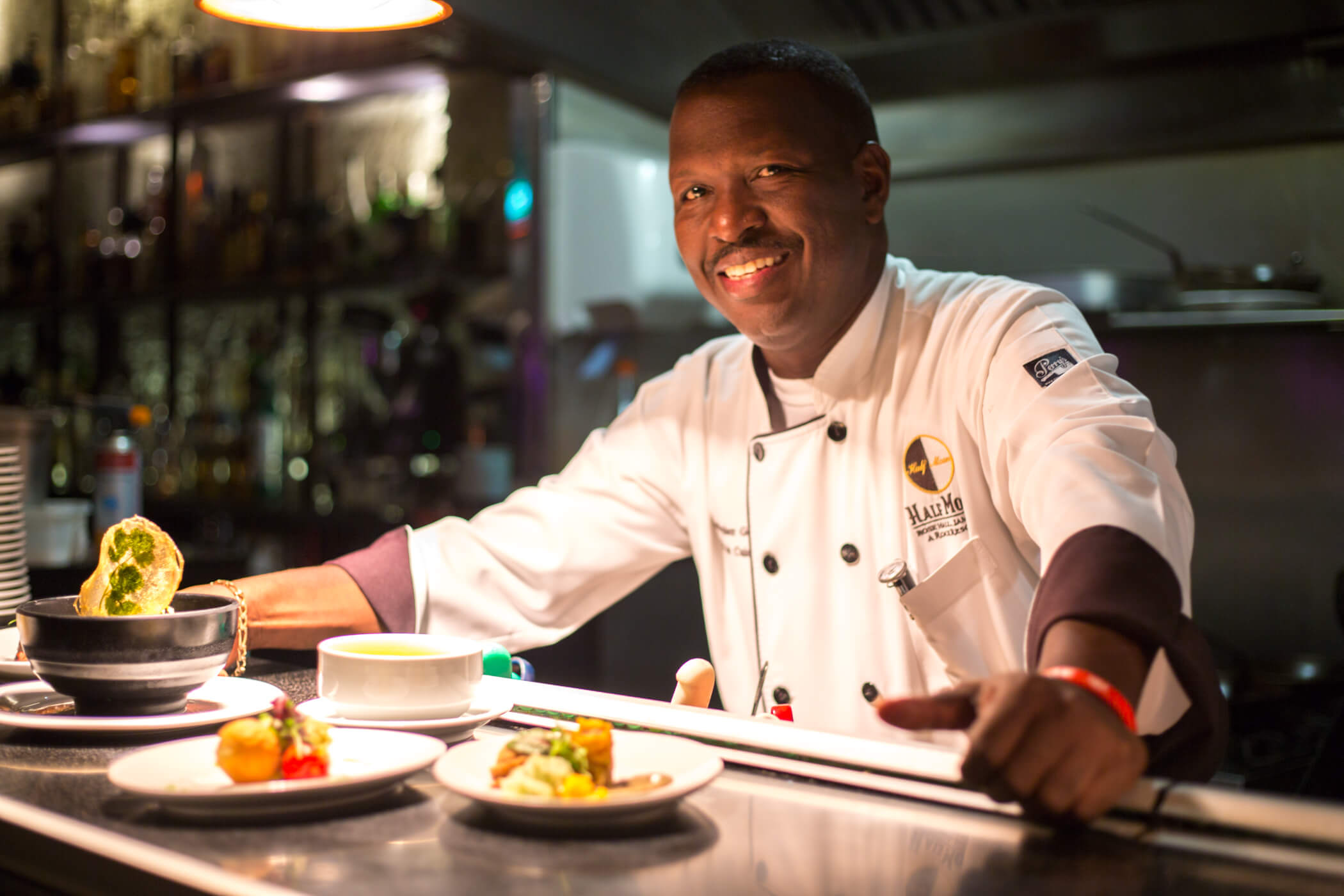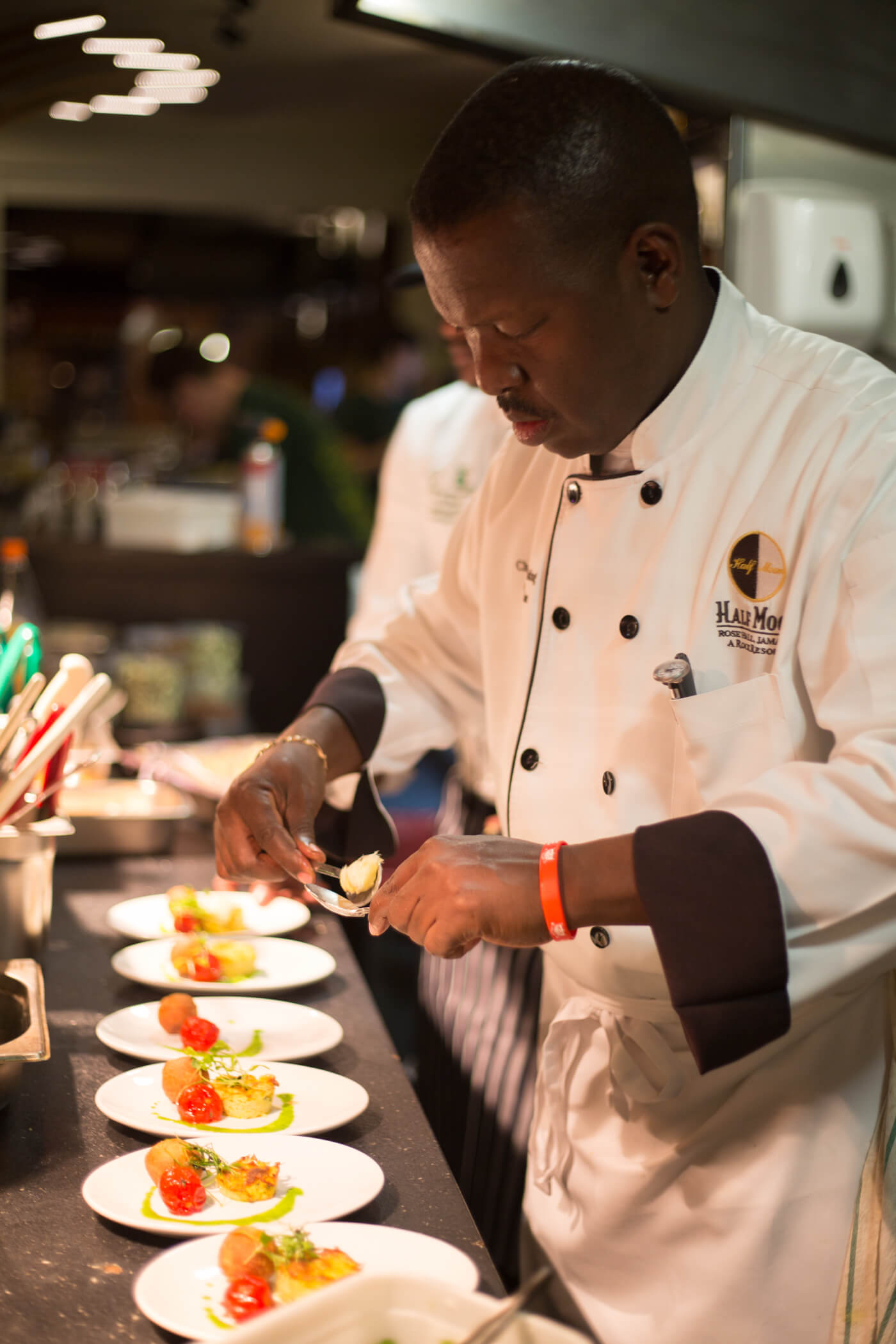About Time You Met: Chef Christopher Golding, Sugar Mill RestaurantBy Alicia Grimshaw
Chef Chris Golding is at the helm of Jamaica’s iconic Sugar Mill Restaurant. Having re-opened its doors last year following a full refurbishment and recognised as one of Jamaica’s top fine dining restaurants, Sugar Mill Restaurant showcases natural island flavours and spices, bringing dishes to diners that go far and beyond the ‘jerk’. Last year, we caught up with Chris who was over in London taking part in the Conde Nast Traveller Chef Series. Everything is best discussed over avocado on toast:
Can you tell us a little more about Sugar Mill Restaurant?

Sugar Mill is a very well-respected restaurant in Jamaica. We picked up the Jamaican Best Restaurant 2016 Award, and that’s our third consecutive year of winning that award. It’s a very special place. I have created a menu that marries traditional recipes and techniques but still stays true to Jamaican cuisine. We use garden-fresh ingredients, including locally grown herbs and spices. I love it there.
Does Sugar Mill attract an international clientele?

Definitely. It has a very rich history. The restaurant has been running for over fifty years, and the royals have been there. It used to be a plantation full of cane fields, and the water mill used to preform the grinding and the milling of the cane and all that. It’s slightly seperate to the hotel, and as a non-guest you can still go and dine there.
What’s your speciality dish?

I like to keep my dishes very authentic. I have a dish that is really spectacular, that highlights the dining experience. It’s like a kebab mixed with jerk sausage, pork, beef, shrimp and what happens is, when that has been served at your table, it’s flamed with rum. And we serve that with rice and peas. The yam risotto is also a favourite of mine. Yam is a root vegetable, like a sweet potato, and because the Jamaican cuisine ties into European, Caribbean and South America influences, we use the yam as a dish made in Italy, similar to risotto. It’s been cooked the same way, but the only difference is, we use yam. What we try to do is use our food, local food, and present it in a way that’s international. Because we have the ingredients, the fresh vegetables, fresh exotic fruit, and the taste of our stuff is spectacular. So we want to ensure that our clients have a good experience of the dishes we produce. We try to create and innovate, and make it the best possible.
Is your cooking style influenced by any other cuisines?
Most definitely. To be honest, I like Italian food. And what strikes me is, their passion for food; they’re very serious about food. It’s sad that most of our Jamaican chefs have the tools, have the ingredients, and have everything to do the job, but they’re not putting their interests and passions in there. Italians are very passionate about their food, culture, the wine, and the ingredients. Why can’t we? If we follow that journey, I think we could do a very good job of it.
Do you think Jamaican cuisine is changing?

Jamaican cuisine is changing, and it’s not moving very fast, but I’m trying to make the best of it. We have some good chefs in Jamaica, like Dennis McIntosh who’s very passionate about the craft, and he’s represented Jamaica in a lot of food competitions. He’s carrying the flag. We can go beyond jerk – it’s not difficult. Our presentation and our technique has to change. Because our techniques and methods are there, we just have to think how to innovate and create. If you think about food, and you love what you do – you can do stuff. You can change stuff. There’s chefs trying to do their best to make an impact on Jamaican cuisine.
How often do you change the menu at Sugar Mill?
We have a new general manager at Half Moon who is an absolute foodie. He’s very knowledgable about food. If he and I sit down, we can talk for 4 hours, and we never get bored about food, because he loves food. And I’m glad that whenever we want to change the menu, we sit together and we knock heads, and we do a lot of stuff. We twist, we change, we infuse, we create new taste, and we balance. We change the menu every year, but we have a new special every day. The special dishes are seasonal, and change varying on what produce we have in the kitchen. The menu is large – we have a grill section where we cook our meats on the Josper oven, which is new. It’s a monster. We cook steak, fish and even pizza. You can grill vegetables over the charcoal, but you can really cook everything on it. It’s a universal oven.
Did you always want to be involved in food?

Always. Every since I’ve known myself, I’ve always been around food. I was inspired by my grandmother, Ida, my great grandmother to be honest. I mean, she was very serious about cooking. She would start her soup, and if it was not to her liking, she would throw the food away and start again. I can’t forget that pot where she usually cooked the soup on. She always made a gungo pea soup with pig tails and root vegetables. Cooking over a wood fire. Amazing.
My brothers and sisters chose administrative careers, and one of my brothers’ is into graphic art – it’s not too far from my craft, but my parents were a little concerned that I chose cooking. I really loved it, and I just never stopped. I never get tired of it. I just keep going, especially when you have something new to do. Those creative juices, you can get lost in it all.
What do you think is lacking in Jamaican cuisine?
By far, presentation. Because you know – people eat with their eyes first. And if the food is not attractive, then god help you if it doesn’t taste good too. Sometimes we create menus that satisfy our clients, and most of the time to be honest, we think we’ve done a very good job. Sometimes the client thinks otherwise. That doesn’t stop the process. The good thing about my restaurant in Jamaica, is that I have the opportunity to speak with the client. I try to go to their table for feedback. The client help me sometime, they help me, I help them. The client almost inspire you to change the dish.
What’s your most 0ff-menu memorable dish?
It was a dish for a vegetarian customer. It was eggplant and cabbage, and I got beans cooking, and I got corn. And I was cooking the cassava chips, and my sauce was tomato and coconut milk together. I added chopped thyme leaves and garlic. And when I served it, it had coconut chips on top. When you satisfy a vegetarian, I feel you’ve really earned your rank. You have to be very creative, especially when people have allergies, and a lot of restrictions for certain things. You really have to think about it.
There’s been a big shift towards traceability and sustainability. What do you think it’s so important now?

If you’re running a very reputable restaurant that costs a lot of money, then it’s your duty to ensure that you give your customers the freshest produce, and quality products. We also have a programme that we’re running right now where farmers are planting exotic fruits and we’ll be using those fruits for our desserts. For this new menu which I’m involved in, I’ve organised three farmers already – because you can get most ingredients imported form the States, but by the time it gets to Jamaica, it doesn’t stand up that much. We cater and care about every client. We never under estimate a client.
Do you think ethical sourcing and organic produce is also important?
Definitely. We rely heavily on meat from overseas. And that’s the difficulty of being on an island – we have to depend on an overseas market to gt our hands on wagyu beef and Angus steak. But we have to ensure that we get the correct product. There’s some stuff that if it isn’t good, we’ll send it back.
Photo Of Chris: Emma Jones


